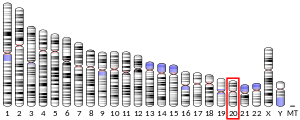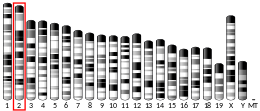MKKS
McKusick-Kaufman/Bardet-Biedl syndromes putative chaperonin is a protein that in humans is encoded by the MKKS gene.[5][6]
This gene encodes a protein with sequence similarity to the chaperonin family. The encoded protein may have a role in protein processing in limb, cardiac and reproductive system development. Mutations in this gene have been observed in patients with Bardet-Biedl syndrome type 6 and McKusick-Kaufman syndrome. Two transcript variants encoding the same protein have been identified for this gene.[6]
References
- 1 2 3 GRCh38: Ensembl release 89: ENSG00000125863 - Ensembl, May 2017
- 1 2 3 GRCm38: Ensembl release 89: ENSMUSG00000027274 - Ensembl, May 2017
- ↑ "Human PubMed Reference:".
- ↑ "Mouse PubMed Reference:".
- ↑ Stone DL, Agarwala R, Schaffer AA, Weber JL, Vaske D, Oda T, Chandrasekharappa SC, Francomano CA, Biesecker LG (Apr 1998). "Genetic and physical mapping of the McKusick-Kaufman syndrome". Hum Mol Genet. 7 (3): 475–81. doi:10.1093/hmg/7.3.475. PMID 9467007.
- 1 2 "Entrez Gene: MKKS McKusick-Kaufman syndrome".
External links
Further reading
- Stone DL, Slavotinek A, Bouffard GG, et al. (2000). "Mutation of a gene encoding a putative chaperonin causes McKusick-Kaufman syndrome". Nat. Genet. 25 (1): 79–82. doi:10.1038/75637. PMID 10802661.
- Slavotinek AM, Stone EM, Mykytyn K, et al. (2000). "Mutations in MKKS cause Bardet-Biedl syndrome". Nat. Genet. 26 (1): 15–6. doi:10.1038/79116. PMID 10973238.
- Katsanis N, Beales PL, Woods MO, et al. (2000). "Mutations in MKKS cause obesity, retinal dystrophy and renal malformations associated with Bardet-Biedl syndrome". Nat. Genet. 26 (1): 67–70. doi:10.1038/79201. PMID 10973251.
- Hartley JL, Temple GF, Brasch MA (2001). "DNA cloning using in vitro site-specific recombination". Genome Res. 10 (11): 1788–95. doi:10.1101/gr.143000. PMC 310948. PMID 11076863.
- Beales PL, Katsanis N, Lewis RA, et al. (2001). "Genetic and mutational analyses of a large multiethnic Bardet-Biedl cohort reveal a minor involvement of BBS6 and delineate the critical intervals of other loci". Am. J. Hum. Genet. 68 (3): 606–16. doi:10.1086/318794. PMC 1274474. PMID 11179009.
- Wiemann S, Weil B, Wellenreuther R, et al. (2001). "Toward a catalog of human genes and proteins: sequencing and analysis of 500 novel complete protein coding human cDNAs". Genome Res. 11 (3): 422–35. doi:10.1101/gr.GR1547R. PMC 311072. PMID 11230166.
- Simpson JC, Wellenreuther R, Poustka A, et al. (2001). "Systematic subcellular localization of novel proteins identified by large-scale cDNA sequencing". EMBO Rep. 1 (3): 287–92. doi:10.1093/embo-reports/kvd058. PMC 1083732. PMID 11256614.
- Katsanis N, Ansley SJ, Badano JL, et al. (2001). "Triallelic inheritance in Bardet-Biedl syndrome, a Mendelian recessive disorder". Science. 293 (5538): 2256–9. doi:10.1126/science.1063525. PMID 11567139.
- Deloukas P, Matthews LH, Ashurst J, et al. (2002). "The DNA sequence and comparative analysis of human chromosome 20". Nature. 414 (6866): 865–71. doi:10.1038/414865a. PMID 11780052.
- Slavotinek AM, Searby C, Al-Gazali L, et al. (2002). "Mutation analysis of the MKKS gene in McKusick-Kaufman syndrome and selected Bardet-Biedl syndrome patients". Hum. Genet. 110 (6): 561–7. doi:10.1007/s00439-002-0733-3. PMID 12107442.
- Strausberg RL, Feingold EA, Grouse LH, et al. (2003). "Generation and initial analysis of more than 15,000 full-length human and mouse cDNA sequences". Proc. Natl. Acad. Sci. U.S.A. 99 (26): 16899–903. doi:10.1073/pnas.242603899. PMC 139241. PMID 12477932.
- Badano JL, Kim JC, Hoskins BE, et al. (2003). "Heterozygous mutations in BBS1, BBS2 and BBS6 have a potential epistatic effect on Bardet-Biedl patients with two mutations at a second BBS locus". Hum. Mol. Genet. 12 (14): 1651–9. doi:10.1093/hmg/ddg188. PMID 12837689.
- Wiemann S, Arlt D, Huber W, et al. (2004). "From ORFeome to biology: a functional genomics pipeline". Genome Res. 14 (10B): 2136–44. doi:10.1101/gr.2576704. PMC 528930. PMID 15489336.
- Kim JC, Ou YY, Badano JL, et al. (2005). "MKKS/BBS6, a divergent chaperonin-like protein linked to the obesity disorder Bardet-Biedl syndrome, is a novel centrosomal component required for cytokinesis". J. Cell Sci. 118 (Pt 5): 1007–20. doi:10.1242/jcs.01676. PMID 15731008.
- Mehrle A, Rosenfelder H, Schupp I, et al. (2006). "The LIFEdb database in 2006". Nucleic Acids Res. 34 (Database issue): D415–8. doi:10.1093/nar/gkj139. PMC 1347501. PMID 16381901.
- Ewing RM, Chu P, Elisma F, et al. (2007). "Large-scale mapping of human protein-protein interactions by mass spectrometry". Mol. Syst. Biol. 3 (1): 89. doi:10.1038/msb4100134. PMC 1847948. PMID 17353931.
This article is issued from
Wikipedia.
The text is licensed under Creative Commons - Attribution - Sharealike.
Additional terms may apply for the media files.




